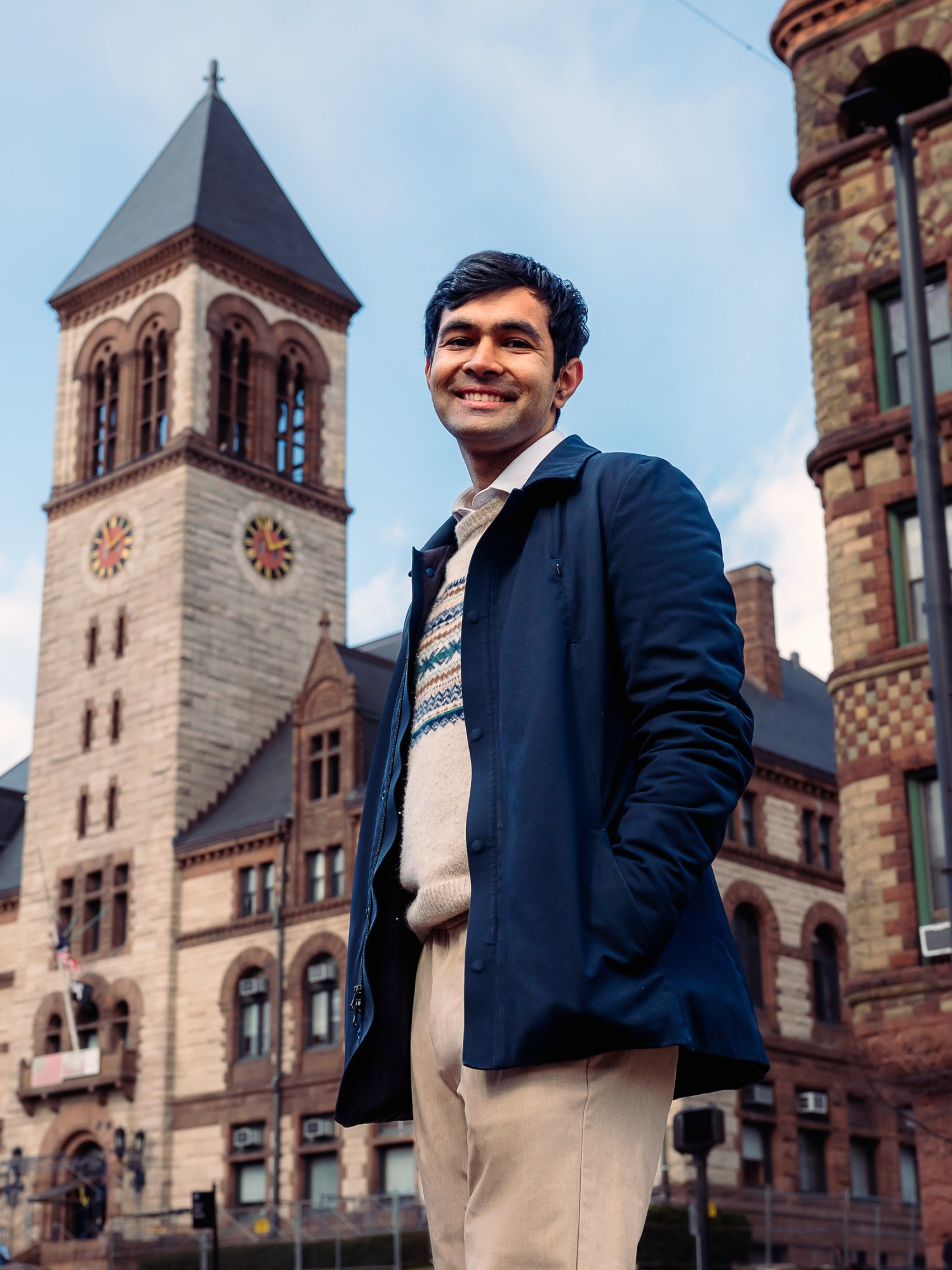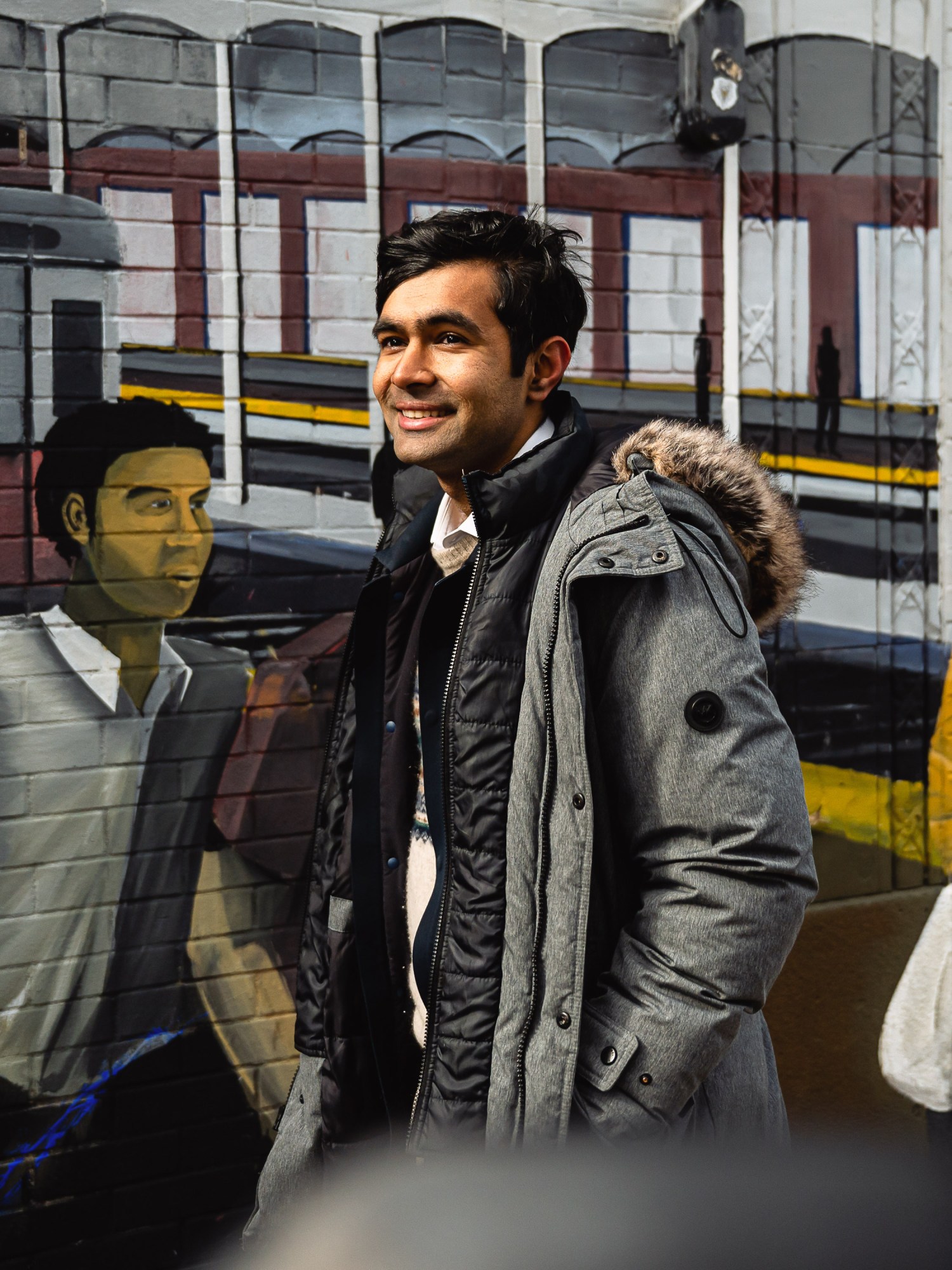A walking antidote to political cynicism
Burhan Azeem ’19 had never been to a city council meeting before he showed up to give a public comment on an affordable-housing bill his senior year. Walking around Cambridge, he saw a “young, dynamic, racially diverse city,” but when he stepped inside City Hall, most of the others who had arrived to present comments were retirees reflecting a much narrower—and older—demographic.
Less than a year later, Azeem set out to shift the balance in who gets to make decisions on behalf of the city by running for city council himself.
A materials science and engineering major, Azeem had long been civically engaged, volunteering for Ayanna Pressley’s campaign for the US Congress as a junior. But what really set him on the path to local politics was his curiosity about why living in Cambridge is so expensive. He’d experienced the problems that arise from a lack of access to affordable housing as a kid in New York, and he wanted to understand what was contributing to that problem in the city where he’d chosen to live as an adult.
He launched his campaign a month before graduation—encouraged by Marc McGovern, himself a council member and at the time the city’s mayor, whom he’d met while campaigning for Pressley. (In Cambridge, the council chooses the mayor from within its ranks.) Azeem lost by a hundred votes, but he outperformed a candidate who’d raised more than $40,000, while he himself had raised less than $7,000. That made him think it might be worth another try. So in 2021 he ran again, and he won by 200 votes. At age 24, he was the youngest Cambridge city councilor ever elected.
He quickly set to work trying to make Cambridge a better city, passing bills focused on housing, transit, and climate initiatives. Those successes set him up not just to win reelection in November 2023, but to garner more votes than any other council member but the mayor.
“We passed a lot of policy—way more than an average term,” he says. “What’s cool about city council is that even though we don’t have as big a scope as Congress or the state house, we have absolute power where we do have power. Over our roads and housing zoning policy, even the president cannot tell me what to do. I think that’s why I’ve had so much success: I’m very narrowly focused on the places where we can make a really big change.”

in November 2023,
garnering more votes
than any other council
member but the mayor.
If Azeem didn’t have an average first term, maybe it’s because there’s very little about him that’s average. In addition to serving on the city council, he’s also employed full-time at Tandem, a startup offering pop-up veterinary clinics, a pharmacy, and telehealth for pets that he helped get off the ground with former classmates from MIT, among others. As the company’s head of AI engineering, Azeem has led an effort to use AI to suggest medications and is working on developing tools that could potentially help vets with diagnoses. The founding team is the same one with which he helped build DayToDay Health, a startup that offers digital tools and live chat to support human patients before and after medical procedures. Having served as an EMT with MIT’s Emergency Medical Services as an undergrad, Azeem found working for DayToDay especially meaningful during the pandemic, since it gave him a way to serve his fellow citizens when everyone was in lockdown at home. DayToDay scaled from eight people to over 400 and was sold just before Azeem was elected to his first term.
“He’s like a Swiss Army knife. It doesn’t matter what the challenge is—he’s the person you want to keep with you.”
Prem Sharma ’18, CEO and cofounder, Tandem and DayToDay
As if that weren’t enough, Azeem is also one of the cofounders and a current board member and treasurer of Abundant Housing Massachusetts, a nonprofit seeking to address the state’s housing shortage and legacy of housing segregation. The organization, which started in 2020 as a group of volunteers meeting in an MIT classroom, now has six full-time employees and a million-dollar annual budget. In addition to pushing for laws aimed at increasing the housing supply, it also creates tools and resources to help grassroots groups take advantage of existing legislation like the MBTA Communities Act, a zoning reform bill meant to help Massachusetts add more than 280,000 homes near existing public transit.
“I tell him all the time, ‘I don’t know how you do it,’” says Prem Sharma ’18, CEO and cofounder of Tandem and DayToDay, who’s called Azeem a coworker and friend for years. Though Azeem has lots going on, Sharma insists that he “delivers results” at work and “his output is always quality … he’s one of our top people.”
“He’s like a Swiss Army knife,” Sharma adds. “It doesn’t matter what the challenge is—he’s the person you want to keep with you.”
Policy priorities from personal experience
Azeem was born in Multan, Pakistan, and moved to Staten Island, New York, with his family in 2001, when he was four. His parents had immigrated after winning the visa lottery, in pursuit of financial options that might help them pay down medical debt that had arisen from his sister’s premature birth. Money was tight, so they moved in with family friends.
“There were 11 of us living in this three-bedroom. We were too many people to be legal, so we would hide out in closets whenever the landlord came over,” he recalls. “We were very nervous about being caught, which is a big reason I skipped pre-K and kindergarten.”
The family moved often from one place to another within Staten Island over the next decade. Though in some ways it was a tough place to grow up as a Pakistani immigrant kid, especially in the years after 9/11, Azeem considers himself “very lucky” in that he was naturally gifted enough at science and math to get into a science and technology high school. That paved the way for him to eventually attend MIT on a full scholarship.
His experience growing up “very poor,” as he describes it, has informed his policy priorities as an adult. When he considers what he wants to accomplish in office, he’s looking for things that can ease the burden of day-to-day life for citizens who face the kinds of challenges his family did. Those struggles aren’t all just distant memories, either—in the middle of his first term, as he was pushing to pass affordable-housing legislation, he ran into his own difficulties finding an apartment he could afford to rent. Even as someone with a decent salary who was willing to share with roommates, he often found himself competing with upwards of 50 applicants for a single unit in an apartment search process he describes as “horrific.”
“I will do whatever needs to be done. I just don’t want to waste my life.”
“The way that I think about politics is by asking: What are the most expensive things for people [that I can take on as a city councilor]?” he says. “Number one is housing. Number two is child care. And number three is transit. So how can we make those better?”
Azeem has prioritized bills that address all of the above, plus climate policy, another issue he cares deeply about. In his first term, he wrote the bill that made Cambridge the first city in New England to abolish the requirement that new construction include a certain number of parking spaces, which can make housing prohibitively expensive to build. He also played a key role in pushing through amendments to an existing law that pave the way for taller buildings to be built for affordable housing, among other initiatives.

Azeem has ideas for
bills to improve public
transit, make streets
safer for all citizens,
and increase access to
affordable housing.
“I don’t know that he always gets a ton of the credit, but he’s probably been one of the most, if not the most, prominent councilors on a lot of the housing issues that have been worked on over the last term,” says Cambridge city manager Yi-An Huang, an appointed official who works with the city council.
Azeem worked to update Cambridge’s Building Energy Use Disclosure Ordinance (BEUDO) so that it requires large nonresidential buildings, like those on MIT and Harvard’s campuses, to reach net zero emissions by 2035. He also helped pass the “specialized stretch energy code,” which requires all new construction and major renovations to rely entirely on electricity or be wired to transition to such a system in the future, and advocated for the buildout of 25 miles of protected bike lanes in the city. But while he’s pushing for more affordable housing, he’s also working to block a proposal that would ban lab development in Cambridge. Although its proponents say the ban is meant to preserve space for housing, he says a lot of developments include both lab space and housing, so it’s not one or the other. And he sees the research that goes on in the city’s labs as essential to its economic vibrancy.
He credits his success in part to being “really good at the boring technical stuff,” as he puts it. “I write my own policy and I go through all the details of the bills,” he says, noting that not every local politician is willing or able to do that. “There’s lots of stuff that people just don’t enjoy doing, and if you can find a way to enjoy it, then there’s lots of work to be done.”
Huang says Azeem’s tendency to pore over every detail makes him stand out, as do his “listening very well” and his collaborative approach. “He’s impressively in the weeds on policy,” he says. “He does his homework and understands the issues and really grapples with the nuance.”
A lifetime to go
Though young people are notorious for skipping local elections, Azeem sees his experience as a testament to the remarkable power of hyperlocal politics—and to why his peers shouldn’t sit them out.
“[The city council] has a roughly $1.25 billion budget. Divide that by nine [council members], and it’s over $100 million per person. Each of us gets elected on 2,000-ish votes. So it’s almost $60,000 per vote. That’s your impact,” he says. “I lost by 100 votes in my first election and won by 200 in my second. If you had taken the person who came in 10th, and replaced them with me, more than 100 million dollars would have gone in a different direction than they did. That’s crazy to think about: 200 citizens decided where $100 million went.”
In his second term, Azeem hopes to influence where another $100 million–plus will go. He already has ideas for bills that he thinks will increase public transit options, help Cambridge fight climate change while adapting to its impact, make it easier for citizens to afford basic necessities like housing, and make streets safer for cyclists, pedestrians, and all citizens.
He acknowledges that public service is not always the easiest choice to make as a young person. Despite his remarkable work ethic and ambition, Azeem is still a twentysomething who wants to enjoy his life. Going out with his friends for a night of dancing can be a bit odd when it ends with people approaching him and asking, “Are you my city council member?” He even got recognized once when he was using a dating app.
From Sharma’s perspective, the best way to understand Azeem’s seemingly boundless drive is through the lens of “immigrant psychology,” which Sharma in many ways shares. “When I was starting this new company, he wanted to join,” he recalls, “and I was like, ‘How will you do all of this? Starting a new company is demanding. You cannot do both that [and be on city council]. He said, ‘I will do whatever needs to be done. I just don’t want to waste my life.’”
With reelection in the bag, and with a fresh influx of funding at Tandem, Azeem is finding himself in a more stable position than he’s been in for a long time, which is affording him new space to think about the future. He’s grateful that he’s been able to both work in local politics and be part of two successful startups, but he knows that down the line he may have to choose one path or the other.
He hasn’t decided yet which will win out. But what he does know for sure is that he wants to leave a legacy he can be proud of—and he’ll be happy to let his work speak for itself.
“A lot of people feel like they need to be in the spotlight because they feel like they’re the ‘main character,’” he says. “But five to 10 years from now, when I’m looking back, I just want to see that the things I did are still around and having a positive impact.”



